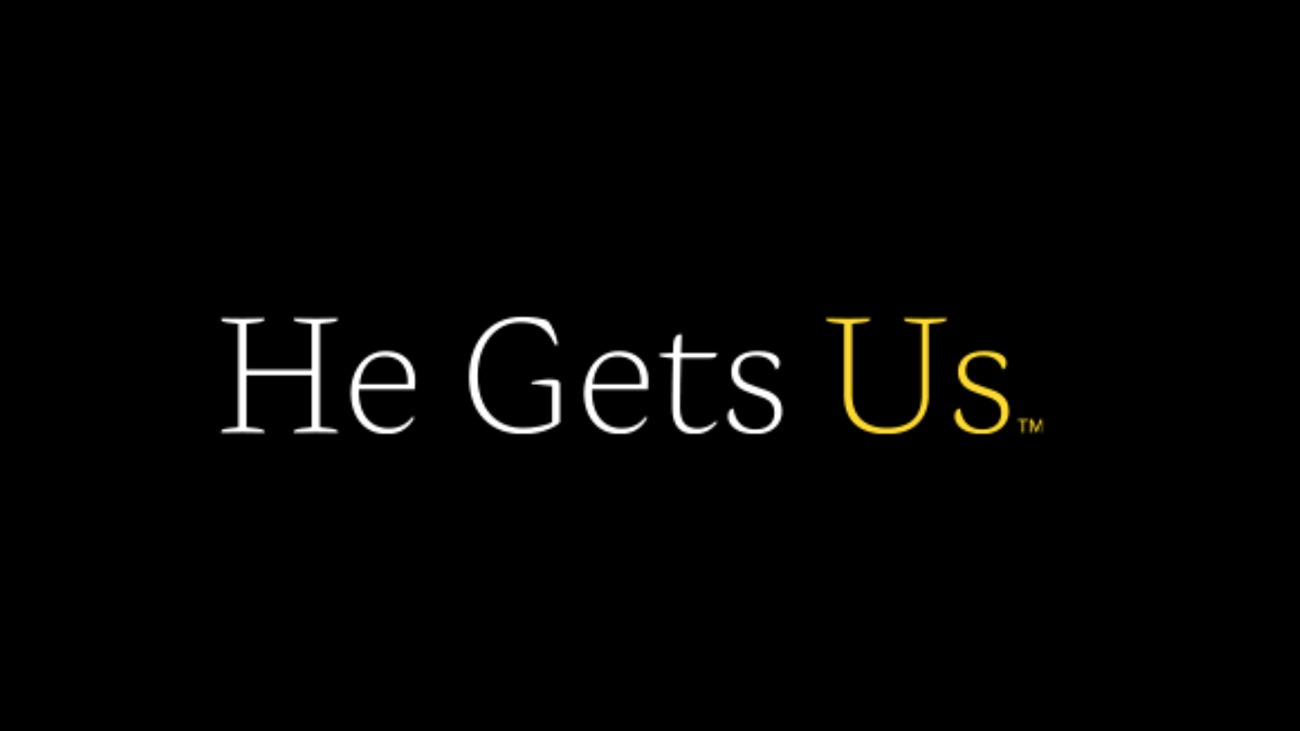Why the ‘He Gets Us’ Super Bowl ads make Jews nervous
Whatever happened to #Pluralism?

(RNS) — Get ready for a Super Bowl Jesus Blitz that promises to far outscore the Hanukkah-Christmas “December Dilemma” on the Jewish Anxiety Scale.
If you have missed the “He Gets Us” ads that have been airing during NFL games and other television shows for several months now, they use documentary-style photos showing dramatic scenes from modern American life — immigrants at the border and a death-row execution — to make parallels with Jesus’ message and his crucifixion.
A little proselytizing is expected and inoffensive, even in the sports events, where we are used to seeing players pray and signs citing John 3:16. It comes with the territory of coexisting with an evangelizing religion. I’ve always felt Judaism can hold its own quite nicely in the marketplace of religious ideas.
What’s different this time is the scope.
The “He Gets Us” campaign looks to spend a billion dollars to reach the broadest possible swath of Americans. “The Greatest Story Ever Told” meets “The Greatest Ad-Buy Ever Sold.” Two of the ads will be shown during the Super Bowl, which means, for Jews especially, that the Good News will officially be in our face.
Jason Vanderground, a spokesperson for the campaign, stated in an interview on CNN, “We are trying to unify the American people around the confounding love and forgiveness of Jesus.”
Unify?
Notice that Vanderground did not say “unify American Christians.” He wants to unify all Americans under the banner of the cross. That includes me.
Unity is admirable and needed. That’s what the Super Bowl, at its best, accomplishes, with a hundred million Americans watching the same thing at the same time. But as a recent Pew survey demonstrates, unity under a Christian banner is a fleeting dream. America’s Christian majority is in steep decline.
If the sponsors are looking to recapture lapsed Christians, there are a number of places they can look where Jews may not be as prevalent. But if you look at the content of the ads, the prey here is not exclusively lapsed or young Christians, but all progressives, among whom are the approximately three-quarters of America’s Jews, who voted on the left and center-left side of the spectrum in 2020.
Just look at the ads themselves, and see the hashtagged topics featured on the campaign’s home page: #Refugee. #Inclusive. #Women. #Relationships. #Judgment. #Hope. #Justice. #Struggle. #Activist. I half-expected the next hashtags to be #Wokiest, #Vegan-but-can’t-resist-lox-&-a-schmear and #taking-a-knee-during-the-national-anthem.

“He Gets Us” campaign logo. Courtesy image
There’s no evidence that the campaign specifically targets Jews, but it is in the tradition of Christian outreach that consistently paves over Jewish identity in its rush to evangelize. Recently, Ric Worshill, executive director of the Southern Baptist Messianic Fellowship, expressed concern over the rise of antisemitism, and his suggested response was not to support Jews unequivocally, but to love-bomb them with Scripture. “There needs to be an urgency in us to share the Gospel with every single person we meet,” he said.
The historical precedents are overwhelming. Do we need to remind the sponsors about #Crusades, #Inquisition, #Supersessionism (the original “Great Replacement” theory) and #Forced Conversion? Proselytizing is a sensitive topic for us.
Many seriously committed Christians who also happen to be progressive have sufficient respect for the Other to resist broadcasting the Way of the Lord indiscriminately to a broad assemblage of faiths. I have many cherished Christian colleagues who are deeply loyal to their faith, but who have not shown the slightest interest in trying to convert me. And most, by the way, are not impressed by the “He Gets Us” campaign.
Those behind this campaign are not looking for a real unity, one based on tolerance and mutual respect. A “unity” that excludes the religiously unaffiliated who make up more than a third of the country is not unity. A “unity” that threatens an already jittery minority at a very precarious time is not unity.
It’s more like the old Beatles lyric, “Come together, right now … over me.” Yes, we want everyone to join together, but only under our banner, on our terms. Whatever happened to #Pluralism?
Jews have also prayed for a come-together-over-me distortion of unity. But that’s the key. We don’t buy Super Bowl ads, spending a billion dollars that dredge up old nightmares of Torquemada. We prayed, in the privacy of our own synagogues, that people would ultimately come around to believing in the One God, in the words of the Alenu.
Notably, this medieval-era prayer, which itself was thought to promote a chauvinistic, false “unity,” which trumpeted God’s ultimate defeat of those who “bow to vanity and emptiness,” has been softened considerably in more recent versions.
I would perhaps not be as perturbed about the campaign if acts of vandalism hadn’t recently desecrated Jewish-sponsored billboards attempting to spread our message. The goal of that campaign was not to evangelize, but simply to bring people together to combat hate.
What would Jesus say about that, or about the synagogue in New Jersey that was firebombed last week? Maybe his marketers could add the hashtag #endantisemitism-homophobia-and-racism to the home page. I bet Jesus would be OK with that.
Hey, Hobby Lobby co-founder David Green and the rest of the campaign’s big-ticket sponsors. Is your intent truly just to reach out to lapsed Christians from Gen Z? Or is it to make a religious minority feel like we are being targeted yet again, insidiously love-bombing us on the one hand while simultaneously isolating us, evicting us from the tent of “unity”?
Face it, we’re just not that into him. Deal with it and accept us as we are. We’re fine with being a minority. Our kids are proud of who they are (I hope). We know how to stand up to bullies who want to make us feel that we are strangers in our own land. We can stand up to the powerful and the wealthy.
Just like he did.
(Rabbi Joshua Hammerman is the spiritual leader of Temple Beth El in Stamford, Connecticut, and the author of “Mensch-Marks: Life Lessons of a Human Rabbi” and “Embracing Auschwitz: Forging a Vibrant, Life-Affirming Judaism That Takes the Holocaust Seriously.” The views expressed in this commentary do not necessarily reflect those of Religion News Service.)
https://religionnews.com/2023/02/07/why-the-he-gets-us-super-bowl-ads-make-jews-nervous/
No comments:
Post a Comment